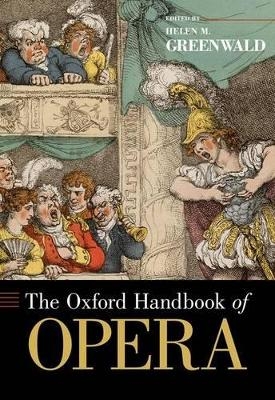
The Oxford Handbook of Opera
Oxford University Press Inc (Verlag)
978-0-19-533553-8 (ISBN)
What is opera? Contributors to The Oxford Handbook of Opera respond to this deceptively simple question with a rich and compelling exploration of opera's adaption to changing artistic and political currents. Fifty of the world's most respected scholars cast opera as a fluid entity that continuously reinvents itself in a reflection of its patrons, audience, and creators. The synergy of power, performance, and identity recurs thematically throughout the volume's major topics: "Words, Music, and Meaning"; "Performance and Production"; "Opera and Society"; and "Transmission and Reception." Individual essays engage with repertoire from Monteverdi, Mozart, and Meyerbeer to Strauss, Henze, and Adams in studies of composition, national identity, transmission, reception, sources, media, iconography, humanism, the art of collecting, theory, analysis, commerce, singers, directors, criticism, editions, politics, staging, race, and gender. The title of the penultimate section, "Opera on the Edge," suggests the uncertainty of opera's future: is opera headed towards catastrophe or have social and musical developments of the last hundred years stimulated something new and exciting-and, well, operatic? In an epilogue to the volume, a contemporary opera composer speaks candidly about opera composition today.
The Oxford Handbook of Opera is an essential companion to scholars, educators, advanced students, performers, and knowledgeable listeners: those who simply love opera.
Helen M. Greenwald is a musicologist, cellist, and translator on the faculty of the New England Conservatory. Her work has appeared in such journals as 19th-Century Music, Acta Musicologica, Music & Letters, Journal of the American Musicological Society, Current Musicology, the Mozart-Jahrbuch, Nineteenth-Century Music Review, Notes, Studi musicali toscani, Newsletter of the Résource Internationale d'Iconographie Musicale, and Cambridge Opera Journal.
CONTENTS ; List of Figures ; List of Musical Examples ; List of Tables ; List of Contributors ; Acknowledgements ; A Note about Translations and Music Examples ; INTRODUCTION: Helen M. Greenwald ; PART I. WHAT IS OPERA? ; 1. Tim Carter: What is Opera? ; 2. Emanuele Senici: Genre ; 3. Derek B. Scott: Musical Theater(s) ; 4. Monika Hennemann: Operatorio? ; 5. Lydia Goehr: The Concept of Opera ; PART II. WORDS, MUSIC, AND MEANING ; The Libretto and the Score ; 6. Vincent Giroud: Oft-Told Tales ; 7. Marina Frolova-Walker: The Problem of National Style ; 8. Damien Colas: Musical Dramaturgy ; 9. Andreas Giger: Versification ; 10. John Warrack: The German Libretto of the Early Nineteenth Century ; 11. William Drabkin: Analyzing Opera ; Humanism, Verisimilitude, and Voice ; 12. Wendy Heller: Opera between the Ancients and the Moderns ; 13. Thomas Betzwieser: Verisimilitude ; 14. Michal Grover-Friedlander: Voice ; 15. Julian Rushton: Characterization ; 16. Lawrence Kramer: Meaning ; PART III: PERFORMANCE AND PRODUCTION ; 17. Hilary Poriss: Divas and Divos ; 18. Martha Feldman: Castrato Acts ; 19. Mark Everist: Rehearsal Practices ; 20. Simon Williams: Acting ; 21. Ryan Minor: The Chorus ; 22. Alessandro Di Profio: The Orchestra ; 23. Linda Tomko: Dance ; 24. Katherine Syer: Production Aesthetics and Materials ; 25. Veronica Isaac: Costumes ; 26. Ulrich Mueller: Regietheater/ Director's Theater ; 27. Mary Hunter: Historically Informed Performance ; PART IV: OPERA AND SOCIETY ; 28. Marianne Betz: Opera Composition and Cultural Environment ; 29. Valeria De Lucca: Patronage ; 30. Georgia Cowart: Audiences ; 31. Daniela Macchione: Autographs, Memorabilia, and the Aesthetics of Collecting ; 32. Marc Weiner: Politics ; 33. Jesse Rosenberg: Religion ; 34. John Graziano: Race ; 35. Alexandra Wilson: Gender ; 36. W. Anthony Sheppard: Exoticism ; 37. Francesco Izzo: Censorship ; PART V: TRANSMISSION AND RECEPTION ; 38. Louise Stein: How Opera Traveled ; 39. James Parakilas: The Operatic Canon ; 40. Paul Watt: Critics ; 41. Thomas Christensen: Soundings Offstage ; 42. Marcia J. Citron: Visual Media ; 43. Helen M. Greenwald: Operatic Images ; 44. Linda Fairtile: Sources ; 45. Charles Brauner: Reconstructions ; 46. Patricia Brauner: Editing Opera ; 47. Philip Gossett: Writing the History of Opera ; PART VI: OPERA ON THE EDGE ; 48. Joy H. Calico: 1900-1945 ; 49. Robert Fink: After the Canon ; EPILOGUE ; 50. Jake Heggie: Composing Opera Today ; Index of Musical Works ; General Index
| Erscheint lt. Verlag | 20.11.2014 |
|---|---|
| Reihe/Serie | Oxford Handbooks |
| Zusatzinfo | 49 halftones, 2 line drawings, 50 music examples |
| Verlagsort | New York |
| Sprache | englisch |
| Maße | 249 x 178 mm |
| Gewicht | 1928 g |
| Themenwelt | Kunst / Musik / Theater ► Musik ► Klassik / Oper / Musical |
| Kunst / Musik / Theater ► Theater / Ballett | |
| ISBN-10 | 0-19-533553-8 / 0195335538 |
| ISBN-13 | 978-0-19-533553-8 / 9780195335538 |
| Zustand | Neuware |
| Informationen gemäß Produktsicherheitsverordnung (GPSR) | |
| Haben Sie eine Frage zum Produkt? |
aus dem Bereich


